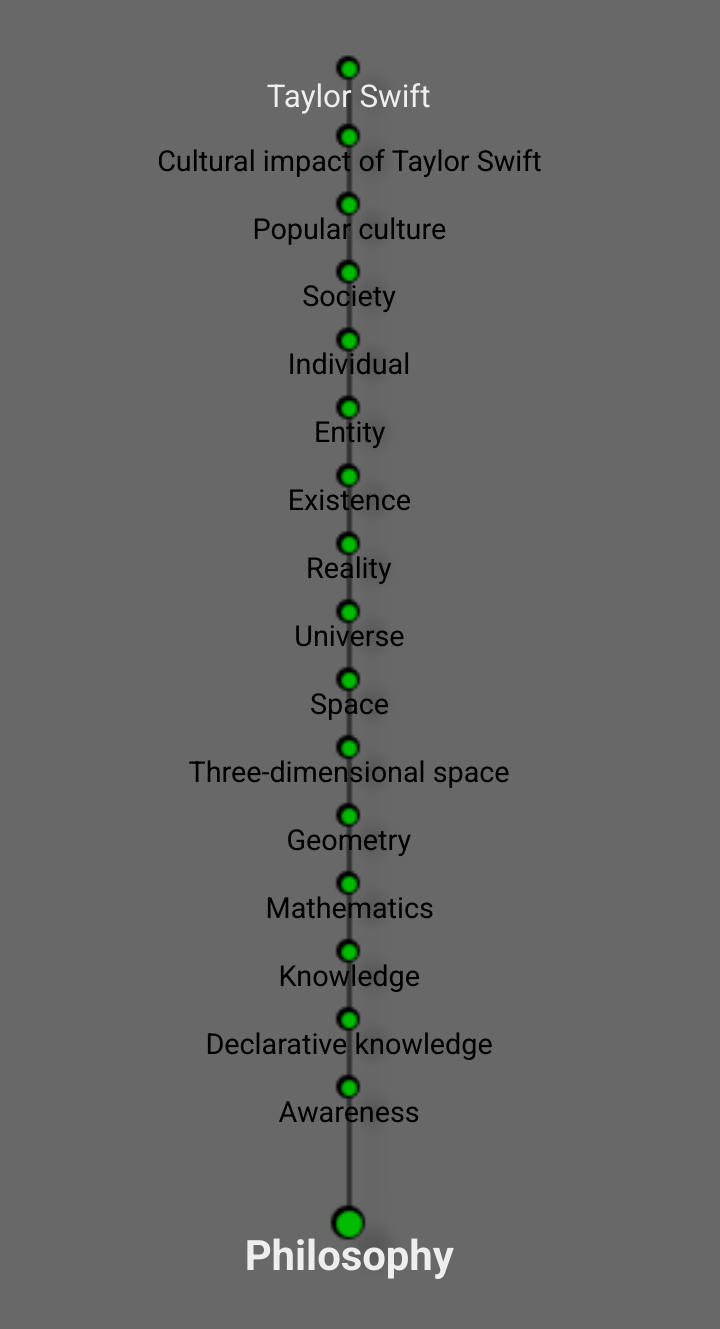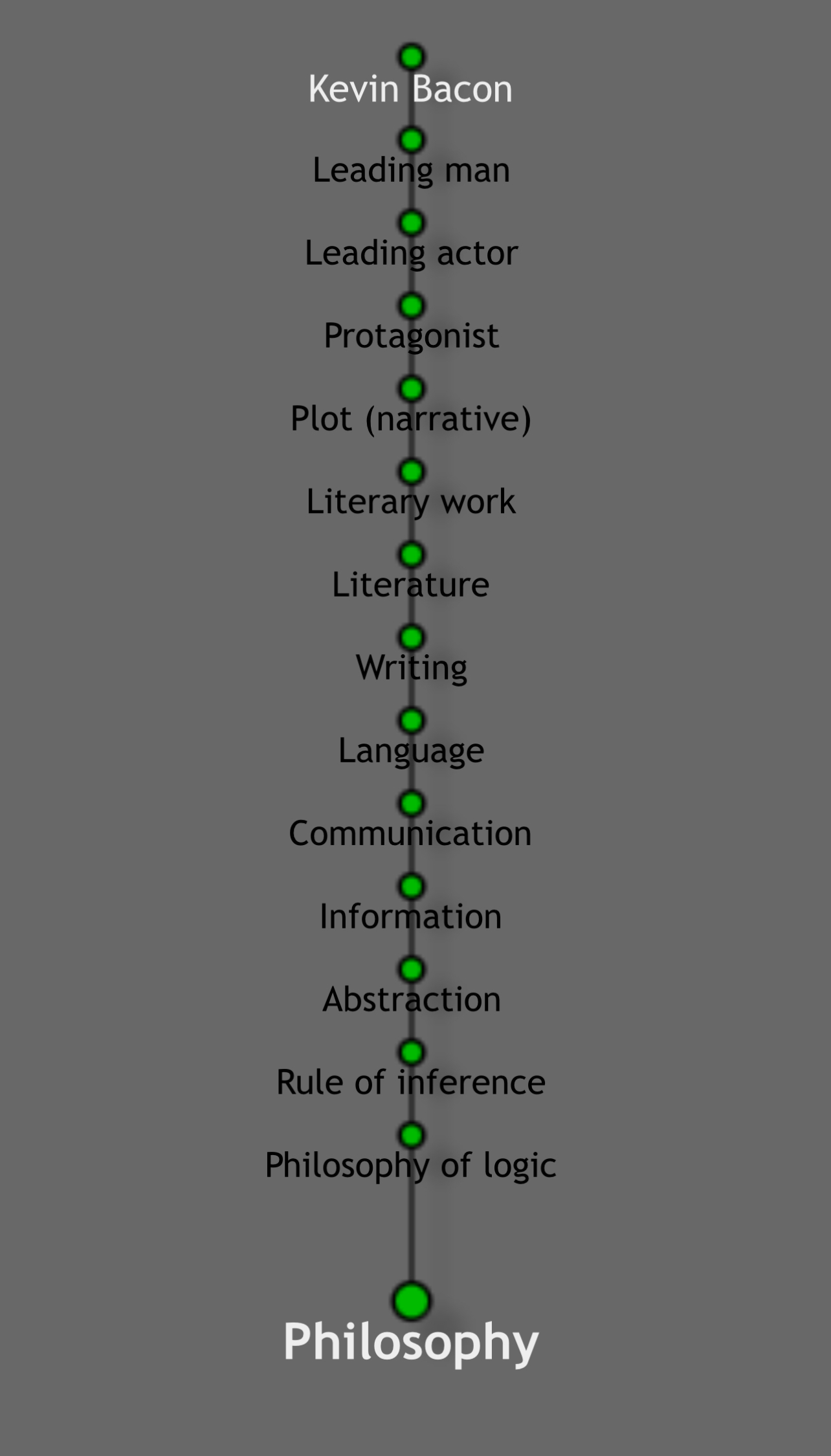Here's the chain for lemmy

Behavior rules:
Posting rules:
NSFW: NSFW content is permitted but it must be tagged and have content warnings. Anything that doesn't adhere to this will be removed. Content warnings should be added like: [penis], [explicit description of sex]. Non-sexualized breasts of any gender are not considered inappropriate and therefore do not need to be blurred/tagged.
If you have any questions, feel free to contact us on our matrix channel or email.
Other 196's:
Here's the chain for lemmy

cool. what software did you use to make this plot?
Philosophy
Almost certainly because the most common opening sentence for an article follows the "[subject] is a member of [broader group]" structure and the more generalized you get, the more you get into entire areas of study, which are eventually classified as a kind of philosophy, which is just fancy-speak for "high-skill thinking."
There have been some theories on this phenomenon, with the most prevalent being the tendency for Wikipedia pages to move up a "classification chain". According to this theory, the Wikipedia Manual of Style guidelines on how to write the lead section of an article recommend that articles begin by defining the topic of the article. A consequence of this style is that the first sentence of an article is almost always a definitional statement, a direct answer to the question "what is [the subject]?"
Wrote a paper on this for a network theory class back in college and came to pretty much the same conclusion. Pages tend to lead to “funnels” of similar general topics, such as Earth, science, etc. and they all make their way upward into philosophy, which is the study of thinking, since thinking is at its core how we perceive the world.
Interestingly there’s two distances from philosophy that pages tend to hover around, the closer one of which is more full of technology and science stuff while the farther one is mostly places. It’s a pretty interesting deep dive

I like the idea that in order to truly understand Taylor Swift, one must first also know about math, geometry, 3D space, the concept of awareness, existence, and reality itself.
"Do you know about Taylor Swift?"
"Who?"
"Oh boy... Do you know about this thing called reality?"

Bro WTF does the Wikipedia article on "Existence" say? Just "Yes"?
A long article with 9 dropdowns... Existence is, in fact, very hard to define.
It's better than nothing
But we live in a society
Fun fact: Since "Philosophy" is part of a loop itself, you could say the same thing about any of the 11 element of that loop, including "Three-dimensional space"
And geometry as well as the universe. That was a wild trip, I tried 5 different things.
I thought the first link in philosophy was philosophy itself.
Edit: I brainfarted while writing. What I meant is "I thought it would be even more interesting if the first link in philosophy was philosophy itself".
Do you mean this part? I don't think that's part of the article. From my understanding, the parentheses isn't counted either.

Actually, no, but I meant something very different from what I wrote hehe I will edit my comment, thanks!
I see. I think wikipedia either forbids links to itself or at least it is against every convention
Sounds reasonable
And I think a word is never twice linked but only the first time it appears. So if "clicking" will occur a second time, it won't be clickable
FYI: that page also gets to philosophy.
Honestly, it would be even more fun if it didn't
What the hell this is cool but kinda creepy.
I mean, it is not that creepy. Philosophy underlies science and almost everything is studied in science. I guess the same is the case for other concepts that are just as broad and fundamental. Or maybe it is possible to go from almost any page to almost any other page. I guess that would make sense too.
Yeah but remember you have to click the first link (except links between parentheses, because they are often translations).
I think it's because, as someone earlier in the thread pointed out. Most article begin by stating what the topic is a subset of. Since everything is a result of humans categorizing and thinking about the world, that inevitably leads back to philosophy.
Don't let yourself be LIED to. BIG PHILOSOPHY is behind this, changing Wikipedia's RULES so that they can CONTROL YOU through YOUR THOUGHTS. Don't let big philosophy win, STOP THINKING.
reject thinking, revert to amphibian
doesnt work with Bradley Cooper
Looks like BAFTA doesn't either: https://en.m.wikipedia.org/wiki/British_Academy_of_Film_and_Television_Arts
It does if you break out of the loop after the third article or so.
Yeah it does
okay wait this is actually real what

Nice follow up game after the old “random article to Hitler“
I thought Jesus was the typical goal?
Something something small world networks
something something dense spanning trees
it looks like you have to skip the part in italics at the top of articles (disambiguation, "other uses", etc..) too for that to be effective
For the pages that eventually end up in loops (not to philosophy), is this kinda mathematically analogous to some of the shapes in Conway's Game of Life?
Not sure what any of this means but pretty cool that you used analogous in a sentence like that
Maybe. I mean, mathematically, both are Iterations. Both can converge towards a final state or get stuck in a loop (a so called attractor). But that's about it.
I don't think so. Game of Life is Turing Complete, and to highly oversimplify what Turing completeness is, it basically means it can theoretically perform any computation your computer can from given instructions. So when a pattern in a Game of Life ends up in a loop, you are actually instructing it to do so, not much different than writing while (true) {} in a computer program for example. While here, it's just two pages ultimately linking to eachother.
Well then, another project to do, DDOS wikipedia using a crawler that checks the average and maximum amount of nodes to get to philosophy
I did Rumpke Sanitary Landfill.
I'll be damned.
Ironically enough, starting with Philosophy gets you to a loop that includes "logic", "reason", and a few others, but never leads back to philosophy.
Whelp, it works on cow patties so... Confirmed?